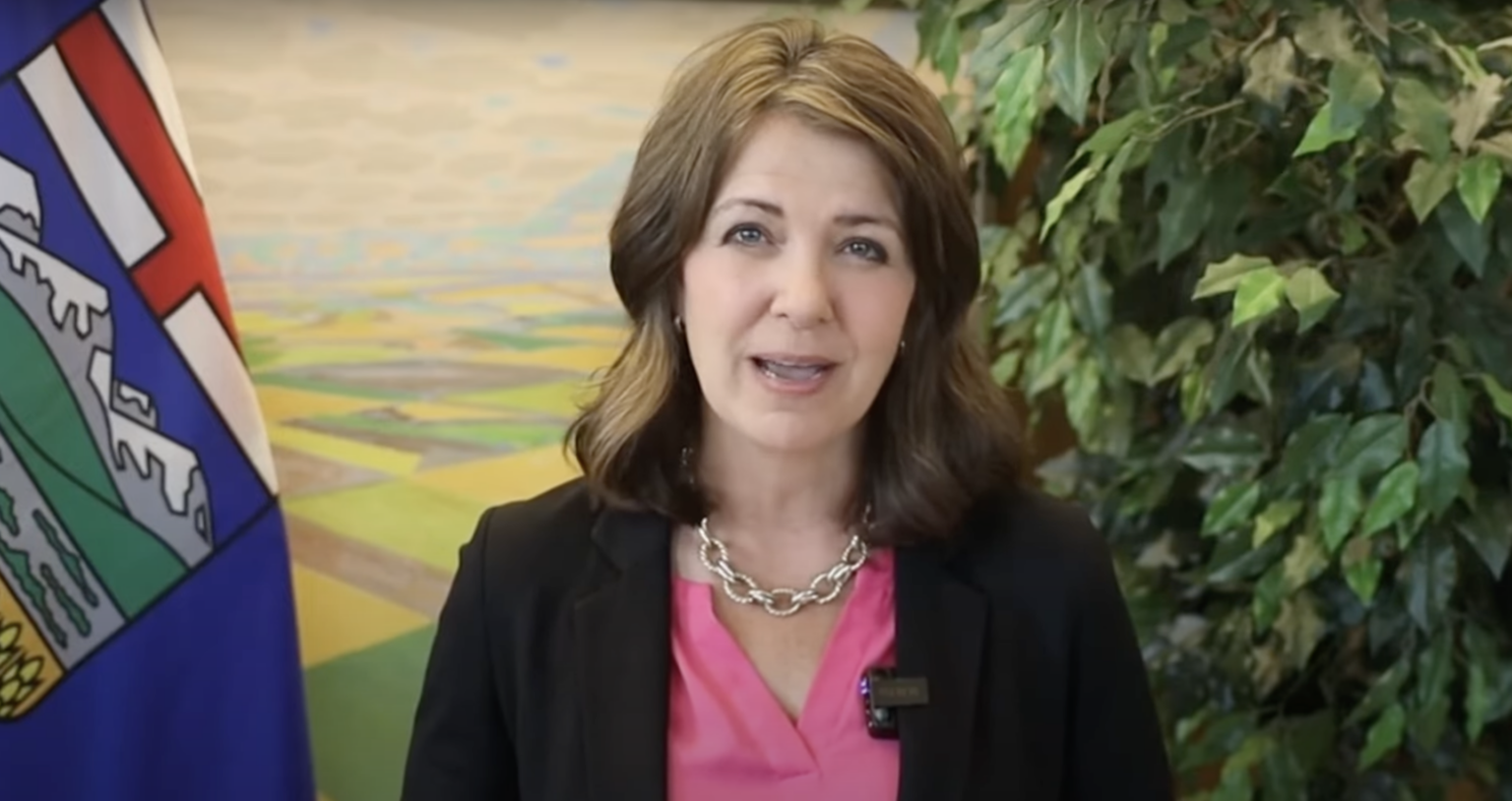Despite a growing global consensus that carbon capture, utilization, and sequestration (CCUS) technology is too expensive and too inefficient to be a viable climate change mitigation strategy, Alberta Premier Danielle Smith promoted CCUS over renewables during a public address Tuesday.
Speaking to a crowd at the third annual Carbon Capture Canada conference in Edmonton, Smith said that interest in CCUS has “never been higher” and that the controversial technology was “critical for decarbonization.”
The premier’s statements on CCUS are contradicted by evidence presented by the Intergovernmental Panel on Climate Change (IPCC), the world’s foremost resource on climate change. The IPCC has determined that CCUS is the most expensive and least effective way to cut greenhouse gas emissions.
Subscribe to our newsletter
Stay up to date with DeSmog news and alerts
The government of Alberta has created a carbon capture incentive program, and has spent $1.8 billion CAD over a decade in support of CCS projects, namely Shell Canada’s Quest project, and the Alberta Carbon Trunk Line (ACTL). In 2022 the Quest project, which converts fossil fuels into hydrogen, was revealed to have emitted more carbon dioxide than had been sequestered. An Environmental Defence report determined that the ACTL, which received $495 million from the government of Alberta, was operating at about 10 percent of its capacity, and was used primarily for enhanced oil recovery (EOR). EOR extends the lifespan of otherwise derelict oil wells, and was the original application of CCUS.
DeSmog has been covering carbon capture for over a decade and has consistently found evidence that the fossil fuel sector is committed to CCUS explicitly as a means to continue oil and gas production. In addition, major CCUS projects in Canada — such as the Pathways Alliance project — have been successful in avoiding environmental reviews by either the provincial or federal government.
Despite considerable opposition from experts, when asked why she continues to support the development of CCUS, Smith replied that new technologies are expensive.
“When you look at the oil sands, it was never supposed to generate any kind of royalty revenue for our province,” said Smith. “And look at where we are today.”
Subsidized Failure
Canada’s oil sands are widely considered to be the dirtiest oil produced on the planet, producing what some have termed a ‘carbon bomb’. In addition to its extremely negative environmental impacts, it is also exceptionally expensive. Direct and indirect subsidies from Canada’s federal government exceed $65 billion from 2019 to 2023.
“We want to be able to preserve the ability for our energy sector to continue to thrive as it reduces its emissions,” said Smith. “I think that we’ve been given sort of a false choice that we have to either choose between our emissions or oil and gas development. I look at it differently. We can develop oil and gas and reduce emissions.”
Smith’s belief that carbon dioxide emissions can be reduced while maintaining oil and gas production cuts to the heart of the controversy surrounding CCUS. Industry has consistently exaggerated carbon capture’s performance — a recent Greenpeace report determined that while the Quest project avoids less than one million tonnes of emissions per year, tar sands emissions increased by 50 million tonnes since the Quest project was initiated in 2006, and by 16 million tonnes since it became operational in 2016.
In addition, Greenpeace determined that Shell made roughly $200 million CAD selling emissions credits for reductions that never occurred, and that when this amount is added to the direct subsidies provided to Shell for the Quest project, Canadian taxpayers covered 93 percent of the total cost of the nearly billion-dollar project.
Smith’s Anti-Renewable Record
Though CCUS has consistently fallen far short of politicians’ expectations and the oil and gas sector’s promises, in her address to the convention, Premier Smith argued that it was renewable energy that had fallen short. She reiterated this later in a scrum when asked whether CCUS is worth the cost, rather than building wind turbines or retrofitting homes with solar panels, two climate change solutions widely endorsed by environmentalists as much as the IPCC.
“That’s pretty expensive too,” said Smith. “I think we have to be realistic. I know that there’s an ideology that suggests that solar and wind and batteries are the solution to all things, and we know it’s not true.”
DeSmog interjected, saying the matter wasn’t ideology, but a matter of science.
“I’ll tell you what science says,” said Smith. “When it’s negative 30 degrees in January, wind turbines don’t work. Solar panels don’t work.”
This is false. While winter conditions can be challenging, with adequate preparation for cold weather environments, wind turbines function normally, even if it’s sleeting or snowing. And because solar cells act like semiconductors, they actually perform better in colder temperatures, even with reduced daylight hours. Solar panels have been powering space stations for over 50 years.
Continuing in her opposition to renewables, Smith also claimed that batteries only offer power for one hour in cold weather. Smith has made similar claims about battery energy storage systems (BESS) in the past that have been challenged by experts as being “ideologically-motivated.” Though operating in extreme cold environments provides a significant technical challenge to BESS adoption in polar or Northern climates, a recent study published in the journal Energy for Sustainable Development suggests that considerable progress is being made.
“We’ve had 15 near failures of our power grid in the last 18 months,” Smith said, “and I can’t operate in the world of fantasy. I have to operate in the world of affordability and reliability, and natural gas is going to be an essential part of that to be able to mitigate against emissions.”
While extreme cold temperatures strained Alberta’s power grid during the winter of 2023 and 2024, this does not appear to have been caused by an over-reliance on renewable energy. In fact, Smith’s government instituted a moratorium on renewable energy development in the province in August of 2023, a decision that threatened billions in clean energy development in the province. Citing internal documents obtained through freedom of information request, The Narwhal revealed the Smith government had made false statements, and that the pause was not initiated — as she had claimed — by the provincial utility regulator. DeSmog also reported that Smith’s statements opposing the use of batteries as part of a transition away from fossil fuels for energy were ideologically motivated. The ultimate culprit for the province’s electricity problems were not related to an over reliance on renewable energy — development of which was paused before the winter — but rather to inaccurate supply forecasts by the Alberta Electric Systems Operator, considerable exports to other jurisdictions, and several of the province’s gas power plants being offline simultaneously. Ironically, it was the province’s wind and solar power assets that appear to have prevented total grid collapse.
DeSmog asked Smith why Alberta wouldn’t want to buttress its energy grid with additional renewable systems, but was cut off by one of the premier’s aides.
Walking away, she said, “We’re just not going to agree on this. But I appreciate your questions.”
Subscribe to our newsletter
Stay up to date with DeSmog news and alerts







